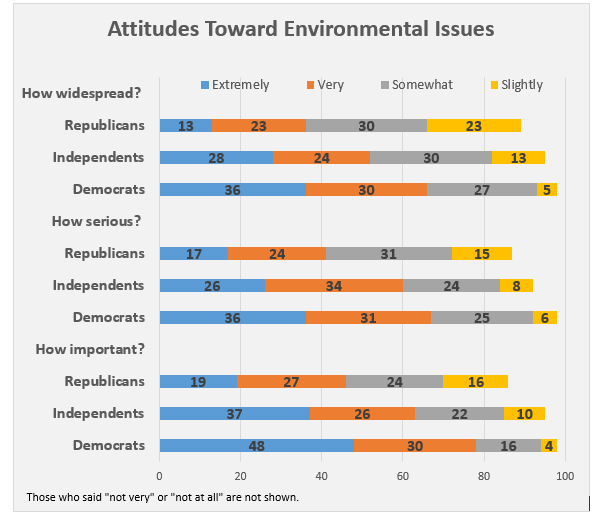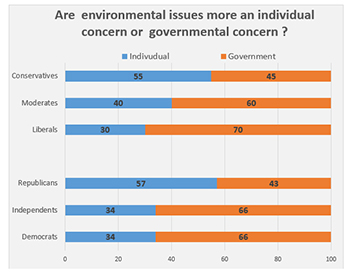Responsibility for the Environment: Individuals or the Government?
3/29/2016
The new Fishlinger Center for Public Policy Research at the University of Mount Saint Vincent seeks to foster meaningful dialog on key public policy issues through independent, objective public opinion research. This initial survey focuses on social issues in the United States.
This is the seventh and final report from the survey; the earlier reports concentrated on human trafficking, the lack of affordable health care, root causes of poverty, domestic violence, the lack of educational opportunities and drug addiction.
In his environmental encyclical last June, Pope Francis called on people of all religions to take swift action. Most Americans consider the environment an important problem that is getting little focus, including a majority of Catholics. Yet there are strong partisan differences in the public’s views. Two-thirds of Democrats and independents say the environment is the responsibility of the government, while 57 percent of Republicans say it is the concern of individuals.
The poll was conducted online May 14 to 26, 2015 with 1,253 adults. Field work was conducted by IPSOS Public Affairs. Blacks, Hispanics and Asians were sampled at a higher rate than their proportion of the population for reasons of analysis.
Importance of the Issue
Nearly two-thirds, 63 percent, of the public regard environmental concerns as extremely or very important. Another 58 percent say that in the United States, environmental problems are extremely or very serious. More than half, 52 percent, consider problems with the environment to be widespread.
However, while 78 percent of Democrats say environment concerns are important, only 46 percent of Republicans have the same opinion. Similarly, 67 percent of Democrats say the environment is a serious problem; only 41 percent of Republicans agree. And in another measure of the magnitude of environmental problems in the United States, 66 percent of Democrats say these issues are extremely or very widespread, compared with only 36 percent of Republicans.

Who is Responsible for the Environment?
Most Americans say that environmental concerns are more the purview of the government rather than the responsibility of individuals.
However, there are strong partisan differences on this question as well. Two-thirds of Democrats and independents say the environment is the responsibility of the government, while a majority, 57 percent, of Republicans consider it an obligation of individuals. Similarly, liberals are more inclined to say the government should be dealing with environmental concerns, while most conservatives feel that the private sector should be handling problems with the environment.

Survey Methodology
The fieldwork for the Fishlinger Center poll was conducted by Ipsos Public Affairs. Online interviews with 1,253 adults were collected May 14 to 26, 2015. Sampling for the survey used a blended approach, combining the Ipsos iSay panel with Ampario sample (a blend of external panel and non-panel sources). Ipsos measures the precision of its online surveys using a credibility interval to measure sampling error. The survey of 1,253 respondents has a credibility interval of plus or minus 2.8 percentage points. The credibility interval may be larger for subgroups. The poll is subject to other potential sources of error, including, but not limited to coverage and measurement error. Data were weighted to match the national population on age, sex, Hispanic origin and race. For purposes of analysis, black, Hispanic and Asian respondents were oversampled. These groups were then weighted down to their proper proportion of the population.
About the Fishlinger Center for Public Policy
The Fishlinger Center for Public Policy Research opened in February 2015 at the University of Mount Saint Vincent. The Center, a member of the American Association for Public Opinion Research (AAPOR), conducts deep and broad studies of public opinion on key public policy concerns through independent and objective research conducted by students, faculty, and other members of the academic community.
By providing a forum for discourse that can stimulate intelligent dialog about issues that deeply affect all Americans, the Center illustrates and enhances the relationship between the work of the College and the common good.
About the University of Mount Saint Vincent
Founded in 1847 by the Sisters of Charity, the University of Mount Saint Vincent offers nationally recognized liberal arts education and a select array of professional fields of study on a landmark campus overlooking the Hudson River. Committed to the education of the whole person, and enriched by the unparalleled cultural, educational and career opportunities of New York City, the College equips students with the knowledge, skills and experiences necessary for lives of achievement, professional accomplishment and leadership in the 21st century.
